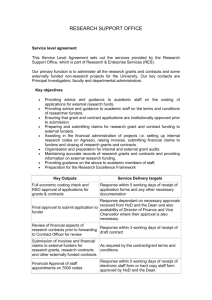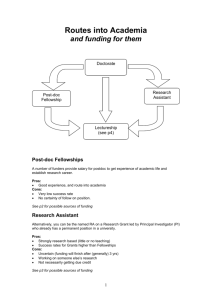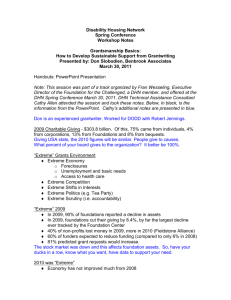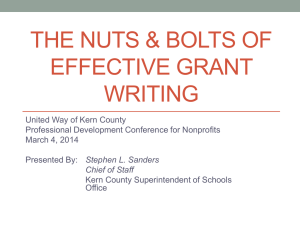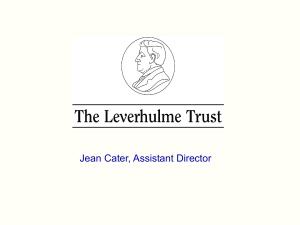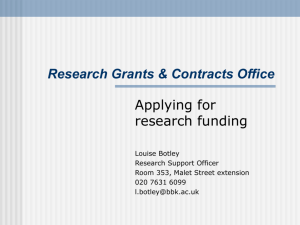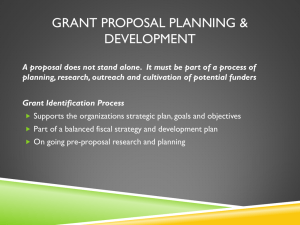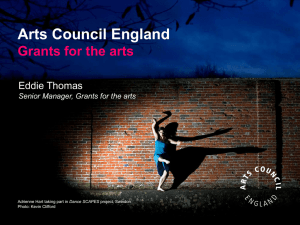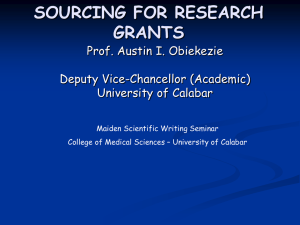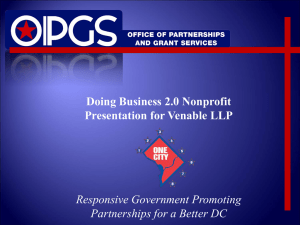Research Grants & Contract Office
advertisement
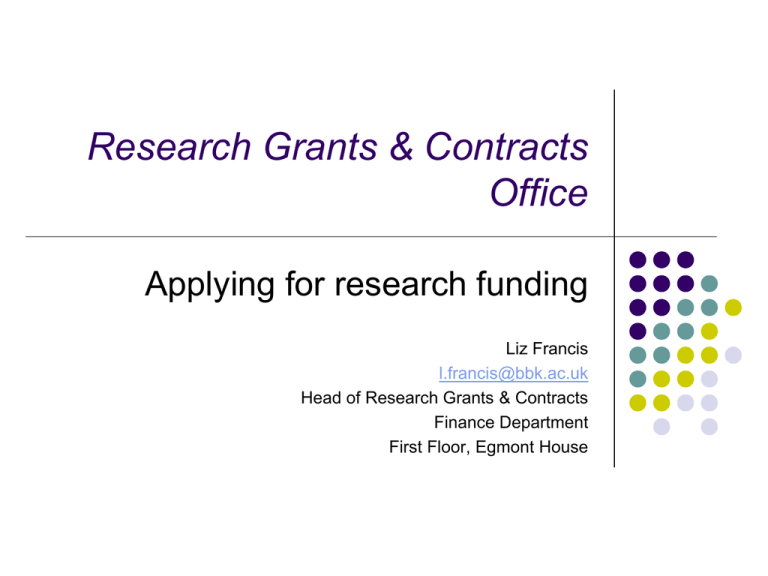
Research Grants & Contracts Office Applying for research funding Liz Francis l.francis@bbk.ac.uk Head of Research Grants & Contracts Finance Department First Floor, Egmont House Research Grants and Contracts Office (RGCO), Finance Department The Research Grants and Contracts Office provides administrative, financial and support services related to externally funded research projects for academic and research staff. The main roles of the office are to: provide funding information assist in the preparation of applications, esp. financial details salaries, overheads advise on contracts and terms and conditions of awards undertake project accounting and financial reporting provide management information for research Summary University research funding Major research funders and their schemes A successful application? Sources of information Who funds university research? UK Government through HEFCE: qualityrelated (QR) funding through the ‘block grant’ BIS Research Councils Charities – UK and overseas UK Government departments, eg. DoH, DfE Commercial sponsors European and others Birkbeck research funders 2010/11: £9.1m £000s 566 196 170 4,143 Research Councils 1,641 UK charities Govt depts EU govt & other Industry Overseas & other 2,386 Types of funding Fellowships Project / programme grants Small grants Travel & Subsistence / conference Other, e.g. large scale equipment grants Social Sciences Economic and Social Research Council British Academy Leverhulme Trust Wellcome Trust – Biomedical Ethics Others… Economic and Social Research Council (ESRC) 2009/10 Research budget: £211m Thematic Priorities 2011-2015: Economic Performance & Sustainable Growth – enable the development of robust government and private sector strategies to ensure the sustainable growth of the UK economy Influencing Behaviour and Informing Interventions - Create a better understanding of how and why people and organisations make decisions, and how these can be managed or influences A Vibrant and Fair Society – Develop ways to enhance the role and contributions of citizens, voluntary sector organisations and social enterprises to create a vibrant national and global society. Future Research Leaders scheme (Early career researchers) This scheme replaces the Postdoctoral Fellowship and First Grants schemes. Awards are for a maximum of 3 years with an overall limit of £215,000 (at 100 per cent full Economic Cost). The scheme aims to: enable outstanding early career social scientists – in partnership with their host institution – to develop the skills to become future world leaders in their field The first year of the scheme, 2011, had an open call with proposals involving secondary data analysis and the application of innovative research methodology are particularly encouraged. The ESRC fund a maximum of 60 per cent of the applicant’s time and the institution must support the remainder of the applicant’s normal salary. Early career researchers with less than four years postdoctoral experience are eligible. A minimum of 70 awards funded British Academy The British Academy is the UK’s national academy for the humanities and social sciences (inc. psychology). 2011/12 programmes budget: £25m Strategic priorities 2008-2013 Ideas, individuals and intellectual resources International engagement Communication and advocacy Fellowship British Academy Postdoctoral fellowships 3 years salary support for outstanding recent (within 3 years of award of doctorate) postdoctoral scholars Aims: experience of independent research introduction to teaching career development output and dissemination Intended to improve prospects of permanent posts at the end of the fellowship Two stage application process: Outline application October, notification January Second stage closing date Feb, notification May 45 awards annually, usually 5% success rate Leverhulme Trust Scholarship for the purposes of research and education Annual budget £60m Suitability of research applications to Leverhulme: the originality of the proposed work courageous research (avoidance of the incremental; and the applicant’s ability to take informed risk/blue skies research) a mixture of disciplines (blurring boundaries/lateral impact) individual exploration (hesitation with data banks/cataloguing) the impact of the research outcome on other fields of study and within the immediate field of research research design transcends traditional boundaries a departure from the established working patterns either of the individual or of the discipline Leverhulme Trust Early Career Fellowship researchers at a relatively early stage of their academic careers but with a proven record of research 3 year award – all fields are eligible 80 Fellowships available in 2012 Trust pays up to 50% of the employment cost plus research expenses up to £6,000 pa Closing date – online submission 8th March 2012 www.leverhulme.ac.uk Project grants, programme grants, etc. – Post doc Research Assistant Wellcome Trust Independent charity funding research in biomedical science, medical history and humanities, ethics and society. Spend £600m p.a. on activities. Research Fellowships Post doctoral, not in established academic post Salary and research expenses 2 stage process Prelim applications June or December Full applications August or February University Awards attract important research staff to academic positions Gradual change from fellow to permanent staff member, must be agreed by host institution at time of application 5 year award (3 years full, 50% in 4th yr, 25% in 5th Year) Two stage application process as above Other current social science funders at Birkbeck Arts and Humanities Research Council (check subject eligibility with funder before applying) http://www.ahrc.ac.uk/FundingOpportunities/Pages/Subj ectstatement.aspx Nuffield Foundation European Union Harry Frank Guggenheim Foundation Bridging Trust Socio-legal Studies Association Esmee Fairbairn Foundation A successful application: What the funder looks for High-quality research: an original contribution to knowledge in the field Outputs: what will be the impact of the research? Academic record: evidence of research potential A strong proposal (1) Addresses the funder’s research priorities and the aims of the scheme Clear language without jargon Establishes the context for the research Well-defined aims and objectives Detailed methodology – why these methods? Has the right people on board, i.e. mentor / co-applicant(s), host institution A strong proposal (2) Anticipates potential problems – how will you deal with them? Has realistic ambitions Identifies and addresses training needs Specified outputs and dissemination plans Practical points (1) Allow plenty of time, months not weeks! Read all guidelines, terms and conditions Check your eligibility Consider ethical aspects / approval Check application form requirements, e.g. referee reports, signatures, length of proposal Electronic submission – may need to set up an account prior to deadline Practical points (2) Research previously funded applications to same funder / scheme Choose referees carefully – check they have time. Get the finances right – check with Research Grants Office and justify costs requested Get as much feedback on your draft proposal as possible – INTERNAL PEER REVIEW Consult with the funder if you have any questions Proposal writing guides ESRC – Advice on writing proposals. http://www.epsrc.ac.uk/ResearchFunding/HowToApply/ WritingProposals.htm EPSRC: ‘How to Apply’ http://www.epsrc.ac.uk/ResearchFunding/HowToApply/d efault.htm Funding Information Funders’ websites Supervisor Research grants website http://www.bbk.ac.uk/rgco/ for funding information and list of forthcoming deadlines for major funders www.ResearchProfessional.com
